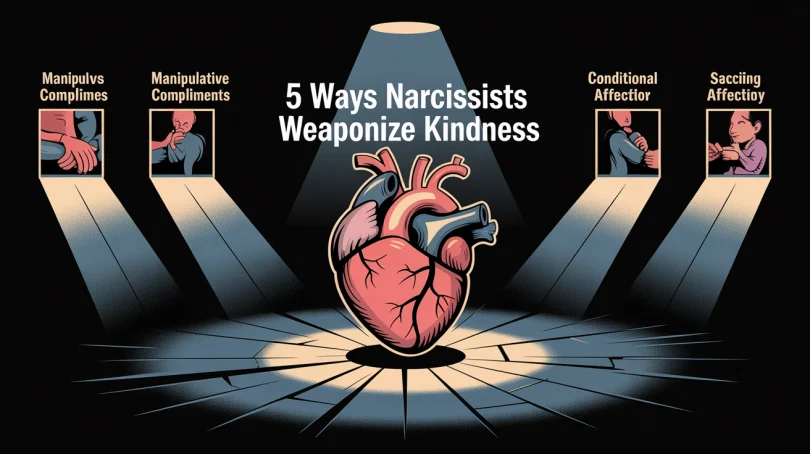Picture this: You are given a bowl of warm soup on a cold day, sudden, thoughtful, and reassuring. You savor it, feeling taken care of, until a bitter taste comes after. Your stomach knots up, your chest hurts, and you know the soup contained guilt in it. That is what kindness is like when it’s an instrument wielded by a narcissist. Not of concern; of control.
In this post, we’ll dive into five ways narcissists weaponize kindness, turning warmth into a tool for manipulation. By the end, you’ll see how these tactics create confusion, self-doubt, and even loyalty to someone who keeps hurting you.
1. The Quiet Transaction: Kindness with Strings Attached
Sometimes, a narcissist’s kindness feels genuinely thoughtful. They might show up with your favorite coffee or offer help without being asked. For a moment, you relax, thinking, “Maybe they care.” But then you push back, maybe you say no to a request or call out something that bothered you. Suddenly, there’s a pause, a sigh, or a vague comment that shifts the air.
That favor wasn’t just a favor; it was a transaction you didn’t know you signed up for. Like finding a bill under your napkin after a “free” dinner, you’re now indebted. Because you’re someone who wants to be fair, you start questioning if you’re too critical or ungrateful, especially after their “effort.” This tactic works by making you shrink your needs to avoid seeming ungrateful, turning kindness into a subtle weapon.
Related Topics:
7 Reasons Why Narcissists Won’t Change?
Why Narcissists Abandon Their Loved Ones?
2. The Carefully Timed Gesture: Disarming Your Clarity
Ever notice how kindness often shows up right when you’re pulling away? Maybe after an argument or when you’re questioning the relationship, they offer a compliment or an unexpected apology. The timing is what makes it powerful. Just as you’re gaining clarity, this softness makes you hesitate, thinking, “Maybe I was too hard on them.”
These gestures are designed to interrupt your strength, creating just enough doubt to keep you from walking away. You start making excuses for them, not because the relationship improved, but because the confusion got louder. You’re not being compassionate, you’re being conditioned.
3. Convenient Compassion: Empathy Under Fluorescent Lights
This is the empathy that only appears when they’re cornered. You’ve called out their behavior, maybe with evidence, and just as the conversation shifts toward accountability, they crumble. “I’ve been through a lot,” they say, redirecting the focus to their struggles. It looks like growth, but it’s emotional redirection, mimicking vulnerability without offering change.
If you’re compassionate, this hits your hope for their growth. But convenient compassion only shows up when they’re losing control, not when you’re hurting. It’s reputation management disguised as remorse, leaving you working to keep the peace while they avoid accountability.
4. The Loyalty Test: Kindness as a Performance
This kindness feels personal, even nostalgic. Maybe it’s a message saying, “Just saw this and thought of you,” or an offer to help with something stressful. It’s meaningful because they know you, your likes, and your vulnerabilities. But if you don’t respond as they expect, the warmth vanishes, replaced by coldness or passive aggression. Suddenly, you’re the one who failed the relationship.
This isn’t a connection; it’s a test to see if they still have access. For those who’ve experienced emotional neglect, this recognition feels like love, but it’s about control. If you pass the test, you get more warmth temporarily. If you hold your boundary, the kindness disappears, leaving you questioning yourself.
5. The Intermittent Reward: Kindness as Relief
This is the hook that keeps you stuck longest. After tension, dismissal, or punishment, just when you start to detach, they return with a small gesture, a vulnerable message, or a moment where they seem to see you. It’s not just kindness; it’s relief, like exhaling after holding your breath. For a moment, it feels like love.
But this kindness is unpredictable, like a slot machine that pays out just as you’re about to leave. Intermittent reinforcement, a powerful conditioning tool, keeps you chasing the next “win.” The good moments are real, but they’re not the whole picture. When kindness is a prize you earn, it’s not love, it’s control.
Breaking Free from the Cycle
Kindness from a narcissist can start as something warm and hopeful, but it’s often laced with guilt, timed for control, or offered only when you’re slipping away. Recognizing these tactics is the first step to untangling yourself from their grip. If you’re wondering whether you’re being pulled back in, watch for signs they’re losing control, those subtle or overt attempts to reel you back.







Leave a Comment